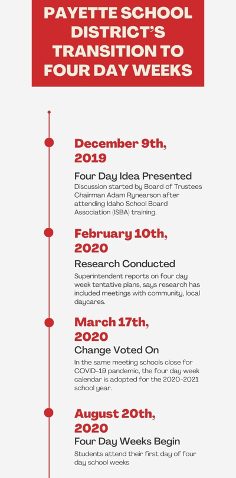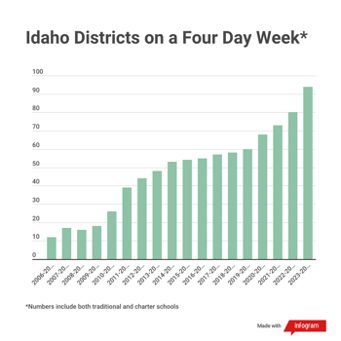Tanya Wilson has no shortage of appointments with five of her 14 children in school. “We are always going somewhere, for something,” she emphasized.
Before the Payette School District switched to four-day weeks, Wilson pulled her kids out of school for doctors and dentist appointments. Now, she makes those appointments on Fridays.
She and her husband have flexible schedules, allowing them to be home on Fridays with their children.
For this family, a four-day school week works great.
It’s a different deal for the Petty family.

Kevin Petty and his wife work full-time outside the house. Petty also works a part-time job on Saturday mornings to help make ends meet.
Their 10-year-old adopted daughter attends elementary school in Payette.
When they heard the school board was considering a change to four-day weeks, they attended school board meetings to try and voice the difficulty it would bring to their family.
“It seemed like there were a lot of people who felt the same way we did,” he recalled. “You know, most of us are working class families…it takes both parents to work nowadays. But the schools are going to do what they need to do.”
Four-day school weeks are a growing trend in Idaho. This year, 94 districts and charters are on four-day weeks — a number that has doubled in the last 10 years. About 50% of Idaho school districts and charters run on four-day weeks, which represents about 34% of the population. Nationally, this number is also increasing. According to the National Center for Education Statistics, about 900 school districts in 26 states are on a 4 day school week. That’s up from 650 districts in 2020 when Payette joined.
Traditionally, mainly rural school districts transitioned to four-day weeks in hopes of increasing teacher retention. However, bigger school districts like Nampa are now discussing the possibility of making the switch.
Families — like the Wilsons and the Pettys — have differing opinions. Most teachers like the idea and administrators use it as a recruiting tool, especially in rural communities or in places where resources are thin.
In Payette, 14.1% of the 9,000 residents live in poverty, almost 4% higher than Idaho’s average. The median household income is about $51,477, compared to Idaho’s $70,214 average.
The Pettys rely on community help with their 10-year-old — local Boys and Girls Club. “Thank God for the Boys and Girls Club,” Kevin said, expressing his gratitude. “All of the daycares in (and around) Payette are full and they don’t want to take on a kid for one day a week.”

It’s been four years since Payette moved to the four-day school week and feelings are still mixed for the 1,313 students and their families.
A swift transition in Payette
The district began discussing the possibility of a four-day week in December of 2019. Three months later, school officials announced the switch and in the same board meeting closed schools due to the COVID-19 pandemic. That August, the four-day school week began.
Local mother Amber Paz says the community was not involved enough in the transition decision, explaining, “once the school board makes up their mind about something, it’s happening.”
However, she says the community and her family have adjusted to a four-day week for the most part.
Though her husband is a first responder for the Payette Fire Department and she works creating large print books for the visually impaired, her job is flexible, allowing her to take her children with her to work every other Friday when her husband cannot be home with them.
She also says the solution works well for teachers who “deserve a three-day weekend” as well as for families who have more time to take trips and do things like hunt and fish.
School trustee perspective

School Board Trustee Andy Kirkendall, who was on the board during the transition, explained over email that the district conducted a “good bit of research” before adopting the four-day school weeks.
He explained the district sent out staff and parent surveys “to get a general consensus from as many of our patrons as possible,” and that “feedback was overwhelmingly positive during the research into moving to the four-day school week.”
He wrote, “The main focus that I looked at was staff retention and recruitment. We face a lot of competition in this area and wanted another benefit to offer our teachers and staff.”

The Boys and Girls Club addresses childcare challenges
Crystal Bolley works graveyard shifts, and her husband is a foreman at a construction company. They have two children and finding childcare on Fridays is difficult. She describes the Boys and Girls Club as “the savior of the community,” noting that she’s thankful her son gets social interaction on the fifth day while she and her husband work.
According to Out-of-School-Network Director Anna Almerico, students on a five-day school week spend 80% of their waking hours outside of school. With a four-day week, this percentage is even greater.
Almerico explained the Boys and Girls Club and other community-based programs focus on helping make these hours outside of school full of opportunities and enrichment for all kids.

Home situations often determine opportunities for enrichment. “The kids who have resources, by the time they graduate, have at least 4,000 more enrichment hours than kids without financial resources,” Almerico explained.
Right now, on the Fridays they are open, the Payette Boys and Girls Club provides all-day services to about 65 or 70 students. They give meals, help students with homework and play indoor and outdoor games.
What’s unclear is how many other students may be staying home while both their parents work all day on Friday.
According to US Census Data, within Payette’s region, 66.6% of households have two parents working outside the home. “I worry that so many parents are just more comfortable with the cell phone being the babysitter, and I don’t know how many parents would be honest to say ‘my kids are home alone.’” Dana Castellani Executive Director for the Boys and Girls Club of Western Treasure Valley commented, describing the difficulty of reaching some students.
Payette resident Kerry Carpenter Monize expanded on this difficulty. Both she and her husband work full time. She has five teenagers, and originally she was excited about the prospect of four-day school weeks. However, she wrote that generally her kids end up relaxing and sleeping on Fridays instead of being productive.
What the students say
Cody Smithies, student body president of Payette High School, sent out an optional survey asking classmates what they think about four-day school weeks four years after the change.

Smithies recalled that originally the transition to four-days felt quite rushed, “they just dumped it on us and had a page on our website with what was good about four-day weeks.”
Despite the abrupt transition, Smithies says most students quickly got on board with the idea of a four-day school week, which was reflected in a 2020 survey.
The survey responses from last week were also overwhelmingly positive in favor of four-day weeks, with almost all 77 respondents saying they were excited about the idea of four-day weeks when they heard about it in 2020 and still like them in 2024.
Sofia Gonzalez said “I have time to do schoolwork and get more hours at work because I can work a full day on Fridays, and I can schedule any doctors appointments on Fridays so I do not have to miss school.”
Anna Larson said she likes “that I can spend my Friday with my great grandma and then go home and spend time with my parents.” However, she also noted that “the longer school days are kind of challenging and it’s more homework stress but it gives me a free day to work on stuff if needed.”
This was a trend in the survey, with several students mentioning classes can feel crammed with information and more homework during the week.
Alexys Ruiz, a senior who had been in the school district since she was in kindergarten, said she likes that she can work on Fridays, but that overall “there is too much work to do and too much to learn without having enough time to properly learn the materials or get homework done.”
Overall, the survey results showed that students in Payette enjoy having the extra day to do homework, work, spend time with family and friends, and participate in athletics.
Academic achievement in Payette
The data is mixed in Payette.
Since the change in 2020, the graduate rate has decreased from 70.5% to 56.5%, well below the state average of 79.9%.
Positively, chronic absenteeism went down from 25.9% in 2021 to 18.7% in 2023.
Teacher retention has decreased from 87.1% in 2021 to 74% in 2023, compared to a state average of 87.9%.
Many factors contribute to these statistics. For example, decreased enrollment has led Payette to announce a consolidation of schools, moving students from Westside Elementary to Payette Primary or McCain Middle.
Previous studies have been inconclusive about the effect of four-day weeks on student academic performance.
